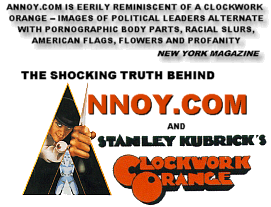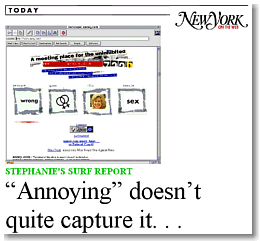
 | ||||||

Saturday, May 1, 1999
Clockwork Annoyance!
The Shocking Truth Behind annoy.com
and A Clockwork Orange!
by Clinton Fein
 On the rare occasion that we respond to our critics, we feel it worthy to highlight New York Magazine's interpretation of annoy.com. While we are not convinced that the comparison to A Clockwork Orange was intended as a compliment, given their sub-title "'Annoying' Doesn't Quite Capture It - How Low Can You Go?" we take it as one nonetheless. We acknowledge that a component of the vision of annoy.com was indeed inspired by Kubrick's interpretation of Anthony Burgess' A Clockwork Orange. While humbled by the comparison, an analysis of the inspiration and interpretation might provide some insight into why we launched annoy.com, and why we fought Attorney General, Janet Reno, all the way to the Supreme Court of the United States of America. A Clockwork Orange was nothing short of a genius audio-visual commentary on socio-economics, politics, racism, misogyny, sex and violence and their inter-relationship to social conditioning, behavioral modification and psychological experimentation that is as astute, powerful and frightening today as it was in 1971. Annoy.com, through its hard-hitting commentary and graphical imagery, as well as its sophisticated technology, aspires to educate by highlighting issues in provocative ways that command attention. Whether we are commenting on war, abortion, gun control or intellectual property issues, our focus is to provide a palette upon which digital artists and thinkers can extend the dialog further. Annoy.com is a legal, social and political experiment. So was A Clockwork Orange. Malcolm McDowell's astounding performance as Alex contributed to the impact the film forcing Kubrick to deal with the unintended copycat violence the film inspired. Censored and banned in a multitude of countries, as were other works of Kubrick such as "Paths of Glory'" and the controversial "Spartacus" and "Lolita," Kubrick was well aware of the impact of censorship and its limitation on expression. Clockwork Annoyance The contradictory immersion of purity, pornography, evil and innocence - much like the flashing annoy.com opening images referred to by New York Magazine - are prevalent in Kubrick's interpretation. From the moment protagonist Alex and his droogs imbibe their drug-laced milk solution, and proceed to kick and torture the living hell out of an elderly homeless man, one is given a mere hint at the violence that will follow. In much the same way, annoy.com presents an idea, whether it pertains to abortion, gun control or many of the socially relevant topics covered by the site without automatically providing a neatly packaged, explanation, apology or resolution. Ideas are not like that. The depiction of something that is offensive or that triggers a response that is disturbing or uncomfortable is a fundamental component of the communication. The expectation that the expression of an idea must adhere to certain standards of contextual disclosure is part of the very 'chill' that annoy.com sought and seeks to extricate itself from. The upsurge in violent and savage massacres in schools, the cowardly bombing of innocent people, be it in Oklahoma, London or Belgrade, or the copycat violence that some, including Kubrick, believe may have resulted from A Clockwork Orange evokes the age-old question of whether life imitates art, or vice-versa. Art, however, can never truly imitate death. Or can it? Message as a Medium  The depiction of violence, sex or other controversial expression without apology or context is difficult to accept and understand. In a similar fashion, reviled but unmistakably talented filmmaker Leni Riefenstahl helped pioneer a new paradigm of motion picture by refusing to be trapped by the convention of plot to communicate an idea, preferring to explore alternative cinematic devices such as motion manipulation and light. Her films of Hitler's rise to power and of the 1936 Olympic games were hailed as the most successful propaganda movies ever made, and later as among the most terrifying movies ever made. Kubrick's visual references to Riefenstahl's Triumph of the Will as the ultimate in extreme violence is an acknowledgement to her construction and a salute to her craft. Both Kubrick and Riefenstahl relished the use of slow or fast motion to convey their powerful imagery. The question is did Leni Riefenstahl create the horror or document it? Did A Clockwork Orange create the violence or imitate it? Is annoy.com the cause or the reflection? The presentation and amalgamation of conflict, context, definition and conclusion within a short time frame is too easy a solution - too quick a fix - to inspire the depth of thought necessary to understand the broader and subtler implications of the communication. Kubrick understood this and could justify the extreme audiovisual depictions presented from the outset to provide a framework with which to explore the themes long after the film had finished. Similarly, annoy.com's heavy-handed approach expresses themes and ideas in a manner that tends to immediately outrage and shock, often repelling the audience or user before providing a broader picture within which to contextualize the offensive expression and move beyond the initial impressions. Kubrick's reliance on culturally sophisticated music such as Beethoven to complement his visual barrage of ultra-violence is an interesting juxtaposition. The choreographed savage beating and raping by Alex to the tune of "Singing in the Rain" is horrifically effective. Often the scatological imagery or adolescent vulgarity of expression on annoy.com is juxtaposed with lauded thinkers, poets and writers, ranging from Thomas Paine to John Donne. Serious issues are often fused with humor. The purpose to engage in expression that defies expectation and provokes a reaction by mixing mediums or genres unpredictably. The harmonious intertwining of politically incorrect expression with correctly political fervor. The attempt to foster outrage to alleviate apathy. Overstating the Obvious One of the more interesting similarities can be found in the art of overstatement. Annoy.com engages in this technique in order to drive home the illogic of the legislation we challenged and to legally and socially push the envelope. Indeed, the violence in A Clockwork Orange is dramatically overstated including such devices as the use of animation in one sequence, much like the animated images on annoy.com's homepage. Or the bold and literal electrically illuminated "Home" sign that demarcates the home of the political writer that Alex returns to after having been asked to leave the home of his parents. The constant barrage of vulgarity and strong language on annoy.com attempts to reduce the power and impact that social and legal taboos give to the meaning and understanding of words and images to convey thought. Annoy.com's vulgar depictions offend the intellectually elite or politically correct. Like A Clockwork Orange, annoy.com is often misunderstood in its intentions. Many people see the violence of A Clockwork Orange as gratuitous without being able to understand its social commentary. The themes of gender are another example. In both A Clockwork Orange and on annoy.com, many are so offended by the objectification of women that they are unable to appreciate the liberation inherent in the exploring of objectification by actually objectifying. The same is true of annoy.com's objectification of men. Kubrick's distrust of government was reflected by his portrayal of the State as a cruel and machine-like nightmare employing the most extreme of measures to shape the thinking of people through social conditioning and mind control experimentation. Annoy.com explored the same concept and attempted to demonstrate its distrust of the government by refusing to rely upon their assurances that the censorship legislation they were implementing and defending was nothing to worry about, instead thwarting such intentions by hauling them before the highest court in the land. Mind Over Matter Perhaps the most dangerous and telling similarity lies in the exposure of what happens when the government intervenes in the thinking of its citizens. The State's attempt to shape Alex's thought processes dangerously misfired. Attempting to purge his mind of sex and violence they employed Skinner-like behaviorist theory as a justification to force-feed him violent and sexual imagery. They inextricably associated thoughts of a sexual or violent nature with overwhelming physical illness, unbearable pain and psychological despair. Unfortunately, they inadvertently associated music with the same impulse reaction by an unplanned and unexpected background score of Beethoven's Ninth Symphony accompanying the violent imagery to which they were subjecting him. (A spectacularly frightening scene for anyone wondering what Eyes Wide Shut really means). The cruelest irony in A Clockwork Orange was not so much the typical scenario of a politician backtracking to take credit for a system of crime prevention, only to reassign blame when it proved a disastrous failure, (and then, of course, taking credit for its demise). The government's attempts to shape thinking by employing methodologies that were not sufficiently planned for, or adequately researched to address the intended objectives, resulted in the ultimate failure. In order to remedy their mistakes, they were forced to recreate the very violent and sexual dysfunction they sought to eradicate to begin with. In this context and for these reasons, annoy.com remains understandably alarmed. You Are What You See Kubrick understood, as does annoy.com, for better or worse, whether we like it or not, that sex, violence and hate are instincts that are as base and inextricably linked with our species as eating and drinking. We cannot pretend they don't exist. We cannot pretend that images, words or sounds that elicit thoughts, no matter what they are or what their reactions are intended to provoke, can be wished away, willed away, punished away or legislated away. Annoy.com, for the most part, has been universally misunderstood. Almost every news item, story, opinion or analysis covering our site and lawsuit, whether legal or based upon our content, has confused or misinterpreted our intentions and motivations. Very few in fact, sought to understand them, by looking a little deeper than what appears on the surface. The graphic sex and violence portrayed by Kubrick in A Clockwork Orange outraged and alienated many as much by the presentation of the content as its meaning. Similarly, what might appear gratuitous displays of vulgarity, hypocrisy, sex and politics interspersed with offensive or annoying speech, are in fact deliberately crafted to draw attention to the damage that can result from knee-jerk legislation and attempts by government to methodize our thinking and regulate our expression. The dialog continues. |
© Copyright 1997-2026 ApolloMedia Corporation. All Rights Reserved. annoy.com Site Information |